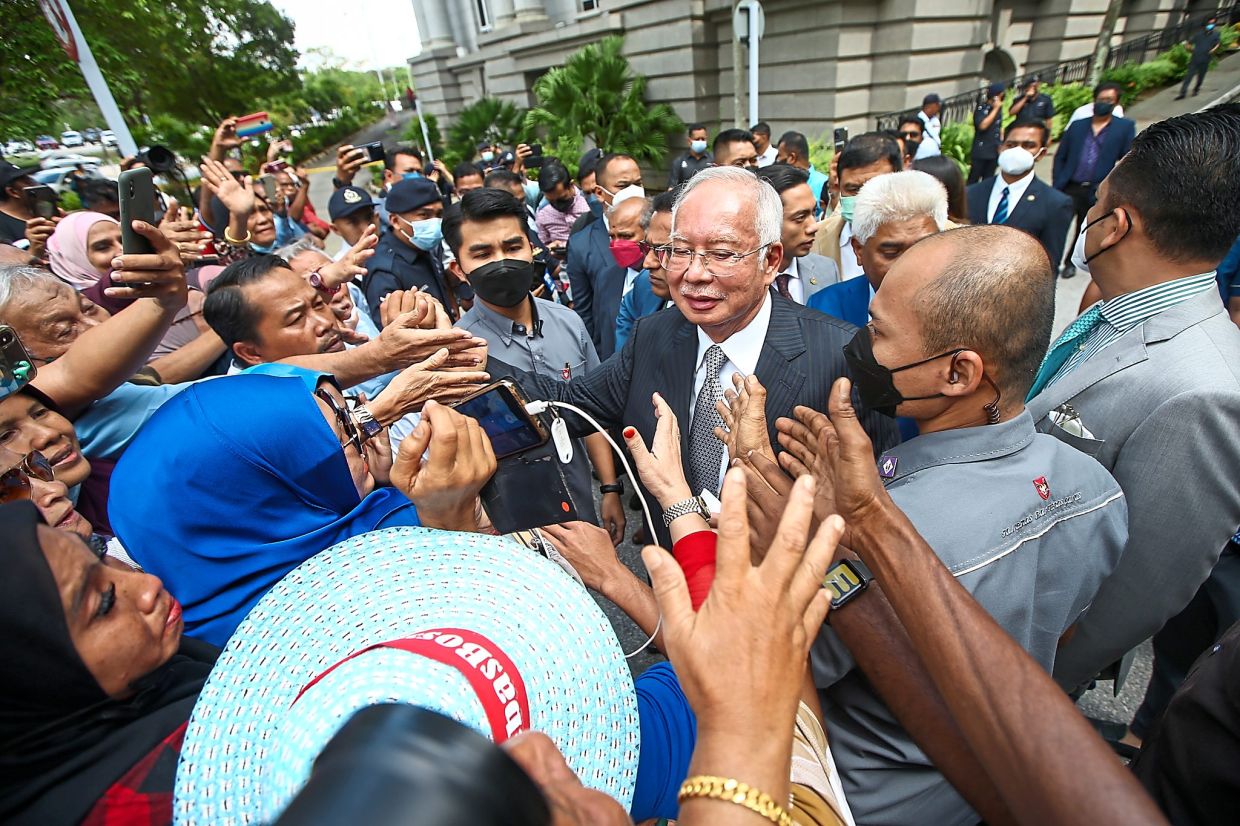
Loyal followers: Najib meeting his supporters at the Palace of Justice in Putrajaya on Aug 23. Some are demanding a royal pardon for the former prime minister. – IZZRAFIQ ALIAS/The Star
LET’S not make a mockery of the judicial process. Datuk Seri Najib Razak has barely spent a week in prison to serve his 12-year jail sentence, yet there are groups already demanding a royal pardon.
Of course, it’s within the former prime minister’s constitutional rights to seek a pardon from the Yang di-Pertuan Agong on the grounds of clemency, but he still must serve his time.
By that, it means a considerable amount of time – usually at least three years – to justify his bid before the Pardons Board, as a first step towards getting the nod from the King.
Najib will not be the only inmate who must plead before the board to be set free from jail. He has to join the long queue, and in most cases, these prisoners would have served decades since their conviction.
Najib has committed a heinous crime, which has been reported worldwide, so why should he be given any special treatment or consideration and priority over others who are probably more deserving of a reprieve?
The usual process of the Pardons Board, which meets regularly, is to first ask for reports from the prison on the behaviour of the applicant inmate, including the nature of the crime committed.
It will then prepare and submit a report from the Attorney General to the King.
Deliberation factors include the length of time served, level of remorse, correctness of the conviction, age and health.
Let’s not forget that Najib didn’t forward any mitigating factors before the Federal Court but decided to pull his lawyers out from making their submissions.
In fact, he claims he has been denied justice. In short, the judges were biased. This defiant stance is sure to complicate any process to earn him an early pardon.
As one comment, which was posted on a news portal, rightly said, “it defeats the retributive and rehabilitative nature of a criminal sentence if a prisoner can obtain a pardon immediately or shortly after a conviction by the court.”
And remember, there are four other on-going corruption cases.
So, how many times do his supporters expect the King to grant him a pardon?
These four cases are related to graft at the 1Malaysia Development Berhad (1MDB) and other government agencies, which could potentially result in more jail time and massive fines.
Basically, it doesn’t make sense for Najib to seek clemency when he has other court cases, with some at the trial stage.
Last week, the Federal Court ordered Najib to serve a 12-year sentence with immediate effect. He was also fined RM210mil. He was found guilty of one count of abuse of power, three counts of criminal breach of trust, and three counts of money laundering.
His supporters rallied outside the palace to seek a royal pardon, just a day before he began his sentence, while his opponents launched an online petition urging the King not to grant him his absolution.
These actions from both sides are mere political side shows and are inconsequential since there can be no immediate pardon from the King because the law is very clear on this.
Likewise, those who had spoken of a pardon before the court sentencing also didn’t know what they were talking about. That’s not how the law process works, and they were simply ignorant.
Najib’s immediate concern would be his Pekan parliamentary seat. He must apply to seek a royal pardon within 14 days but there have been no updates of whether he has done so.
In any case, should Najib lose his seat, it would have little consequence as a general election is expected to be held soon.
If there’s none soon, the elections must still be held by July 15, 2023, because the Parliament term expires after that.
When it comes to pardons involving high-profile politicians, precedents have been set.
Former Selangor Mentri Besar, the late Harun Idris, was convicted of embezzling funds to sponsor the 1975 Muhammad Ali-Joe Bugner boxing match in Kuala Lumpur. He served three years in jail.
Ex-youth and sports minister Datuk Mokhtar Hashim was sentenced to death for the murder of then Negri Sembilan state assembly speaker, Mohamad Taha Taib, in 1982, but was pardoned after serving eight years in jail.
Datuk Seri Anwar Ibrahim was also pardoned only after serving three years and three months for sodomy.
Najib’s biggest immediate concern will be his four corruption cases and the number of years that could be added to his prison stay.





